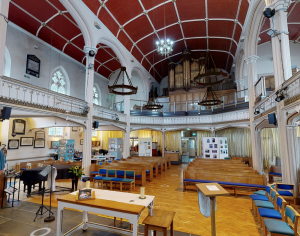An early start to finesse a speech I was going to be giving later in the day. As a member of the General Synod Environment Group, I had been tasked to propose an Amendment to the Land and Nature Motion which would bring the Church Commissioners land holdings to be within the full scope of the motion.
The challenge is that you need to have two speeches ready because until the debate begins you do not know if you will be allowed 3 minutes or 5 minutes to speak. So needed to make sure before setting off that Plan A and Plan B were both ready in place.
The walk to Church House took me past the Houses of Parliament where appropriately for the days programme I walked past a 24 hour vigil being held by Christians Against Climate Crisis.

Discipline
Clergy
Much of the day was spent discussing behaviour and conduct !? Beginning with a Fringe meeting that was updating progress on what is known as the Clergy Conduct Measure. The current practice around how to deal with bad behaviour by clergy is called the Clergy Disciplinary Measure. It is universally agreed that this is not fit for purpose and needs replacing. Mainly because it is seen as a very blunt instrument and minor, often vexatious complaints , are dealt with in the same way as very serious allegations of mis-conduct. Sledge Hammers and Nuts come to mind.

The good news coming out of the meeting is that there will now be a form of triage system that will sift any complaints. And those which are considered to be of a serious nature will be dealt with by a trained and resourced tribunal made up of experienced members. Among those attending the meeting were representatives of the Clergy Union who expressed positive feedback over the progress this process is making.
Lay people
After the Opening Worship the focus was turned on lay people with a debate on whether the Church should draw up a Code of Conduct for PCC Members and alongside it a disciplinary process for the removal from the PCC if the code is not followed. There were strong views on both sides of this argument. One side said , ‘Surely as Christians we can and should love and forgive one another and so such a code of conduct is not necessary’.

On the other side there were stories of bullying and people leaving church congregations because of comments made at PCC meetings. Another observation was that in small communities with so much networking within the wider community if someone was removed from the PCC the ripple effect in a village could result in great damage to the church. In the end the Synod voted for more detailed proposals to be brough forward for further consideration on how this might work in practice.
Safeguarding
Then it was the whole Church of England that came under the microscope. The Church of England’s recent record on Safeguarding has not been a good one. An experienced Safeguarding expert, Professor Alexis Jay, had been asked to make proposals on how this could be improved.

Her report makes chilling reading Her conclusion is that the Church of England safeguarding currently falls below the standards of secular organisations, with inconsistent guidance, data collection, accountability, professional practice and scrutiny.
Her recommendations are that the church establish two new bodies to provide
a. independent operational safeguarding capacity at national and diocesan level, and
b. independent scrutiny of safeguarding at every level.
The debate on the report was a sobering one. Both the Archbishops in their speeches offered apologies to those who have been victims of abuse within the church. In discussing the best way forward there was a recognition that a form of independent scrutiny has to be established so that the Church can rebuild a sense of trust in its safeguarding. But there was a recognition too that the good work that has been going on in improving the practise of safe guarding in the church at a local risks being lost in the creation of a new separate organisation. The outcome of the debate was formation of a “Response Group” which will undertake further consultation and engagement on the proposals before reporting to various national bodies including the House of Bishops and Archbishops Council, before coming back to Synod.

The wider world
Day 2 also included two debates on how the Church and its members link in with the wider world.
There was a motion on Land and Nature which bring aimed to bring biodiversity up the agenda of the Church of England’s overall Environment Programme so that it is given equal consideration with net zero recognising the need to respond urgently to the ecological crisis, in line with the global scientific consensus that the climate change and biodiversity loss crises are intricately linked and with our desire to care for creation.

I had the chance to speak in this debate and so was able to showcase the good work of the Penlee Cluster with its two silver and two bronze Eco-church awards. I was also able to tell the Synod about our plans .. for when the rain finally stops in Cornwall …to create a Community Orchard in the Cholera Field at Paul.

I also shared other examples of good practise in the Diocese of Truro including the use of some Glebe Land in the Falmouth area. This had previously been used for intensive potato cropping with high levels of runoff. It is now let to the Falmouth Food Coop who through their group ‘Love Land’ and with consent from the Diocese have implemented a range of organic, low-food mileage sustainable veg crop growing, and experimenting on grains which will be appropriate as the climate changes https://falmouthfood.coop/loveland

And a debate on the Future of Work which deserved to have more time for debating than the programme allowed. The Bishop of Oxford referred to the deep economic effects of the pandemic, the impacts of new technology, and the global rise of new forms of working. And asked Synod to
(a) affirm the dignity and value of purposeful work as a significant component of human flourishing
(b) endorse and commend the five principles used for evaluating fair and dignified platform work in the gig economy by Fair.work and
(c) form a group to advise us on what is essential to purposeful, dignified, and fair work in the context of the fourth industrial revolution now in progress.’









